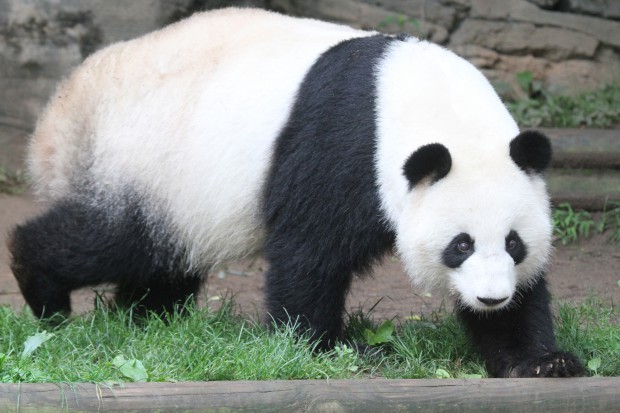Lun Lun will not be artificially inseminated in 2015
After careful consideration and guidance from long-term partners in China, the Animal Management and Veterinary Teams at Zoo Atlanta have confirmed a decision not to perform artificial insemination (AI) on adult female giant panda Lun Lun in 2015. The decision not to move forward with the procedure was made jointly by Zoo Atlanta staff and colleagues at the Chengdu Research Base of Giant Panda Breeding in China.
Timing is a crucial factor in captive breeding of giant pandas, which are fertile for just two or three days a year. The Animal Management and Veterinary Teams had been monitoring Lun Lun, 17, for behavioral signs that her estrous cycle was approaching, as well as conducting hormone analyses for indications that she was nearing her brief peak period of fertility, and, as in previous years, were prepared to perform AI when her cycle occurred.
Lun Lun’s estrous cycle is atypical this year, as female giant pandas generally go through estrus from February to May. This seasonality also affects male giant pandas, which produce increasingly lower-quality sperm the longer time progresses outside of the normal breeding season. The Veterinary Team has recently begun monitoring Lun Lun’s male counterpart, 17-year-old Yang Yang, for lethargic behavior, and since the sperm retrieval process involves general anesthesia, the team has opted not to perform the procedure. The only banked sperm available, collected from Yang Yang in February 2015, is of poor quality.
“The breeding of giant pandas is a process by which the stars truly must all align during an extremely brief window of time. We have been in close and regular contact with our colleagues at the Chengdu Research Base of Giant Panda Breeding, and they are in definite agreement with us that animal wellness factors are paramount over the need to perform AI,” said Hayley Murphy, DVM, Senior Director of Animal Health. “The AI process would involve general anesthesia for both animals – for Yang Yang, for sperm retrieval and for Lun Lun, the insemination – so we see no need to put Lun Lun and Yang Yang through the stresses of anesthesia for a process that had a very low probability of resulting in a cub this year.”
Lun Lun and Yang Yang have never mated naturally in their more than 16 years of association. Lun Lun is expected to cycle as she normally would within the next few days, resulting in the normal physical and behavioral changes usually associated with estrus for giant panda females.
All five of Lun Lun’s and Yang Yang’s offspring have been products of AI. The pair’s firstborn, male Mei Lan, born September 6, 2006, has resided at the Chengdu Research Base of Giant Panda Breeding since 2010. Their second and third cubs, male Xi Lan, born August 30, 2008, and female Po, born November 3, 2010, have lived at the Research Base since 2014. Their fourth and fifth offspring, females Mei Lun and Mei Huan, were born on July 15, 2013, and currently reside at Zoo Atlanta.
Source: Zoo Atlanta










